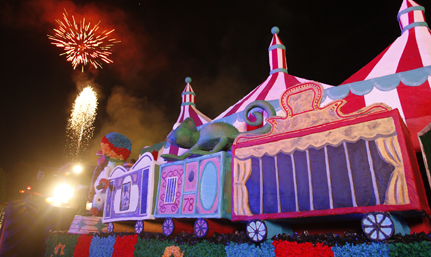|

|
|
Photo: Albert van Biljon
05 February 2013 |
A Rag procession to remember and one of the best in years. This was the opinion of many spectators at the Kovsies’ annual Rag procession on Saturday 2 February 2013. Large numbers of people came to watch the procession moving through the streets of Bloemfontein as students showed off their floats.
A festive atmosphere prevailed along the route and some people came prepared with camping chairs and picnic baskets.
The proceedings began with a morning procession to the Twin City shopping centre in Heidedal and the Kenilworth shopping centre in Mangaung. About 10 000 food parcels were handed out in the two suburbs, while the UFS Cultural Office and KovsieFM entertained the residents.
Prof. Jonathan Jansen, Vice-Chancellor and Rector, as well as members of the senior leadership, went along on the journey to the two suburbs. Dozens of children and adults were at the Twin City shopping centre where hundreds of balloons were released. Kovsie staff, students and members of the SRC at the Bloemfontein Campus met with members of the community and helped to hand out food parcels.
The main procession left from the Bloemfontein Campus at 18:00 and proceeded to the Old Grey’s sports grounds for the Rag concert. Rag-goers were entertained by the music group Mi Casa, the singing duo and twin brothers Locnville, as well as Bobby van Jaarsveld. People were also treated to a fireworks display.
The float of the residences Karee, Soetdoring and Imperium was announced as the winning float.